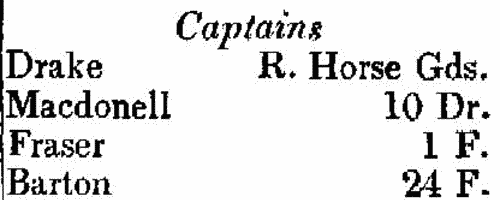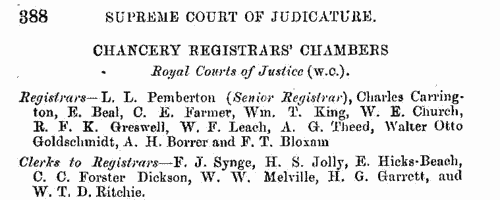Drumgold Surname Ancestry ResultsOur indexes 1000-1999 include entries for the spelling 'drumgold'. In the period you have requested, we have the following 10 records (displaying 1 to 10): Buy all | | | Get all 10 records to view, to save and print for £56.00 |
These sample scans are from the original record. You will get scans of the full pages or articles where the surname you searched for has been found. Your web browser may prevent the sample windows from opening; in this case please change your browser settings to allow pop-up windows from this site.  Apprentices and clerks
(1801) Apprentices and clerks
(1801)
Apprenticeship indentures and clerks' articles were subject to a 6d or 12d per pound stamp duty: the registers of the payments usually give the master's trade, address, and occupation, and the apprentice's name, as well as details of the date and length of the apprenticeship. 2 January to 31 December 1801. IR 1/38DRUMGOLD. Cost: £8.00.  | Sample scan, click to enlarge

| Workers at McConnel & Kennedy's Cotton Mill, Manchester
(1818)
The minutes of evidence taken before the Lords Committee on the Cotton Factories Bill include a series of reports by medical men as to the general health of the mill workers in April 1818. For each factory there is a complete list of workers, giving full name, age, how long employed in a factory, health (in general terms, such as 'Good' or 'Sickly'), and any chronic disease or 'distortion', cause and duration - with slight variations from report to report. The physicians examined several hundred people each day, asking such questions as 'Have you any swellings or sores anywhere?', 'Are your limbs straight?', 'Have you a good appetite for food?', 'Do you conceive yourself to be in good health?', and all concluded that the health of the mill workers was good, and that the workers were cheerful. This is the report for McConnel & Kennedy's cotton spinning factory in Manchester, 21 April 1818.DRUMGOLD. Cost: £6.00.  | Sample scan, click to enlarge

| Manchester Directory
(1825)
W. Parson compiled this Manchester trades directory included in the second volume of the History, Directory, and Gazetteer of the County Palatine of Lancaster, by Edward Baines, published in 1825. The names are arranged alphabetically by surname and christian name, with address, including house numbers where appropriate.DRUMGOLD. Cost: £4.00.  | Sample scan, click to enlarge

| Deaths of British Army officers
(1831-1832)
The official annual Army List included an appendix listing those officers who had disappeared since the previous edition, because of having died or resigned their commissions in the intervening year. This index covers the deaths. Full names are given, arranged by regiment or corps.DRUMGOLD. Cost: £4.00.  | Sample scan, click to enlarge

| Runaway Convicts Apprehended (1836)
The Principal Superintendent of Convicts' Office of New South Wales issued weekly lists of runaways apprehended during the previous seven days. These lists state the convict's full name (surname first), the transport by which brought to Australia, and from whom or from where absconded. March 1836
DRUMGOLD. Cost: £6.00.  | Sample scan, click to enlarge

|  Persons of standing recommending London police recruits
(1843-1857) Persons of standing recommending London police recruits
(1843-1857)
The Metropolitan Police Register of Joiners (MEPO 4/334) lists policemen joining the force 1 January 1843 to 1 April 1857 (warrant numbers 19893 to 35804). The register is alphabetical, in so far as the recruits are listed chronologically grouped under first letter of surname. It gives Date of Appointment, Name, Number of Warrant, Cause of Removal from Force (resigned, dismissed, promoted or died), and Date of Removal. Although the register was closed for new entrants at the end of 1842, the details of removals were always recorded, some being twenty or more years later. Those recruits not formerly in the police, the army, or some government department, were required to provide (normally) at least two letters of recommendation from persons of standing, and details of these are entered on the facing pages. Where a recruit was only recently arrived in the metropolis, the names and addresses of the recommenders can be invaluable for tracing where he came from. Those recruits not formerly in the police, the army, or some government department, were required to provide (normally) at least two letters of recommendation from persons of standing, and details of these are entered on the facing pages: the names in these are indexed here (the police recruits are indexed separately and not included here). Recruits transferred from other forces or rejoining the force did not normally need recommendations - in the latter case, former warrant numbers are given - but some recommendations are from police inspectors, even other constables. Recruits coming from the army sometimes have general military certificates of good conduct, but most often have a letter from their former commanding officer; recruits recommended by government departments (most often the Home Office) similarly have letters from the head of department. But the great majority of the names and addresses in these pages are of respectable citizens having some sort of personal acquaintance with the recruit. Where more than two recommendations were provided, the clerk would only record one or two, with the words 'and others'. Tradesmen are sometimes identified as such by their occupations; there are some gentry. Although the bulk of these names are from London and the home counties, a scattering are from further afield throughout Britain and Ireland. DRUMGOLD. Cost: £8.00.  | Sample scan, click to enlarge

| Elementary Teachers in Lambeth
(1880)
The National Union of Elementary Teachers, established in 1870, brought together members of the profession throughout England and Wales, organized in local Teachers' Associations. Lists of members of the associations were printed in the annual reports. Each association's officers are listed first, then the ordinary members. Surnames are given, Mr/Mrs/Miss, initial(s), and the name of the school - B. S., British School; Bd. S., Board School; Congl. S., Congregational School; End. S., Endowed School; Gr. S., Grammar School; N. S., National School; Par. S., Parochial School; Pres. S., Presbyterian School; R. C. S., Roman Catholic School; Undl. S., Undenominational School; W. S., Wesleyan School.DRUMGOLD. Cost: £6.00.  | Sample scan, click to enlarge

| Missing Next-of-Kin and Heirs-at-Law
(1880)
The Unclaimed Money Registry and Next-of-Kin Advertisement Office of F. H. Dougal & Co., on the Strand in London, published a comprehensive 'Index to Advertisements for Next of Kin, Heirs at Law, Legatees, &c., &c., who have been Advertised for to Claim Money and Property in Great Britain and all Parts of the World; also Annuitants, Shareholders, Intestates, Testators, Missing Friends, Creditors or their Representatives, Claimants, Unclaimed and Reclaimed Dividends and Stock, Citations, Administrations, Rewards for Certificates, Wills, Advertisements, &c., Claims, Unclaimed Balances, Packages, Addresses, Parish Clerks' Notices, Foreign Intestates, &c., &c.' The original list was compiled about 1860, but from materials dating back even into the 18th century: most of the references belong to 1850 to 1880. For each entry only a name is given, sometimes with a placename added in brackets: there may be a reference number, but there is no key by which the original advertisement may be traced. The enquirer of the time had to remit £1 for a 'Full and Authentic Copy of the Original Advertisement, together with name and date of newspaper in which the same appeared'. DRUMGOLD. Cost: £4.00.  | Sample scan, click to enlarge

| Soldiers' Balances Unclaimed
(1882)
The War Office, under 'The Regimental Debts Act, 1863' compiled and published lists of names of deceased soldiers whose personal estate was held by the Secretary of State for War for distribution amongst the Next of Kin or others entitled. These lists give full name (surname first), rank, regiment, and the amount of the estate unclaimed. During 1882 new lists CXLI to CL relating to recent deaths were issued, as well as republications of lists XCI to CL from previous years showing details of balances still remaining unclaimed. DRUMGOLD. Cost: £6.00.  | Sample scan, click to enlarge

| Civil Servants and Office Holders
(1907)
The Imperial Calendar gives lists of officials and office-holders throughout England, Wales, Scotland and Ireland
DRUMGOLD. Cost: £4.00.  | Sample scan, click to enlarge

|
Research your ancestry, family history, genealogy and one-name study by direct access to original records and archives indexed by surname.
|













